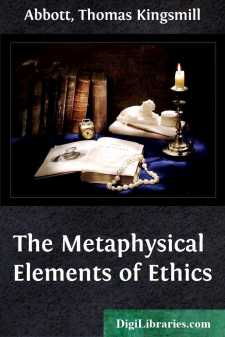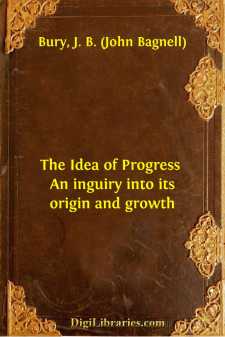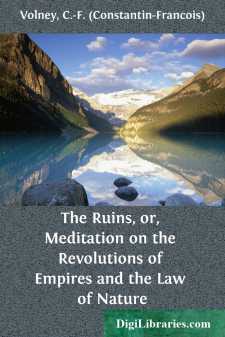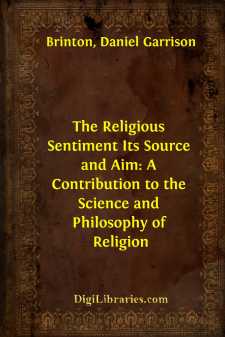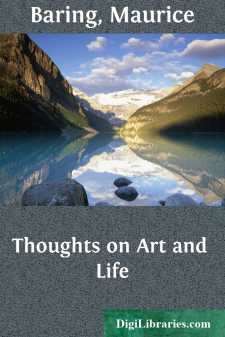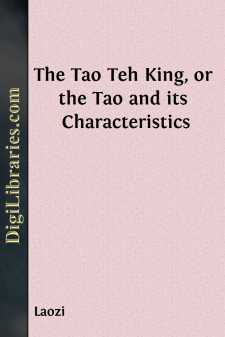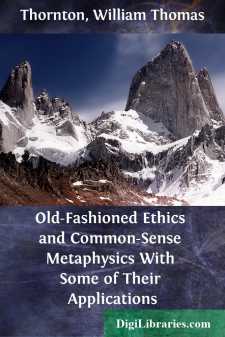Philosophy
- Aesthetics 11
- Eastern 1
- Ethics & Moral Philosophy 2
- General 30
- Hindu 2
- History & Surveys 3
- Logic 1
- Metaphysics 3
- Political 1
- Religious 7
- Social 3
- Taoist 1
Philosophy Books
Sort by:
I. Reincarnation The visible phenomena of the universe are bound by the universal law of cause and effect. The effect is visible or perceptible, while the cause is invisible or imperceptible. The falling of an apple from a tree is the effect of a certain invisible force called gravitation. Although the force cannot be perceived by the senses, its expression is visible. All perceptible phenomena are but...
more...
If there exists on any subject a philosophy (that is, a system of rational knowledge based on concepts), then there must also be for this philosophy a system of pure rational concepts, independent of any condition of intuition, in other words, a metaphysic. It may be asked whether metaphysical elements are required also for every practical philosophy, which is the doctrine of duties, and therefore also...
more...
We may believe in the doctrine of Progress or we may not, but in either case it is a matter of interest to examine the origins and trace the history of what is now, even should it ultimately prove to be no more than an idolum saeculi, the animating and controlling idea of western civilisation. For the earthly Progress of humanity is the general test to which social aims and theories are submitted as a...
more...
Religion THE APOCRYPHA Apocrypha is a Greek word, signifying "secret" or "hidden," but in the sixteenth century it came to be applied to a list of books contained in the Septuagint, or Greek translation of the Old Testament, but not in the Palestinian, or Hebrew Canon. Hence, by theological or bibliographic purists, these books were not regarded as genuine Scripture. That view was...
more...
PARIS TRANSLATION, First published in this Country by Dixon and Sickels.INVOCATION.Hail, solitary ruins! holy sepulchres, and silent walls! you I invoke; to you I address my prayer. While your aspect averts, with secret terror, the vulgar regard, it excites in my heart the charm of delicious sentiments—sublime contemplations. What useful lessons! what affecting and profound reflections you suggest to...
more...
CHAPTER I. THE BEARING OF THE LAWS OF MIND ON RELIGION. The Science of Religion is one of the branches of general historical science. It embraces, as the domain of its investigation, all recorded facts relating to the displays of the Religious Sentiment. Its limits are defined by those facts, and the legitimate inferences from them. Its aim is to ascertain the constitutive laws of the origin and spread...
more...
by:
Maurice Baring
INTRODUCTION he long obscurity of the Dark Ages lifted over Italy, awakening to a national though a divided consciousness. Already two distinct tendencies were apparent. The practical and rational, on the one hand, was soon to be outwardly reflected in the burgher-life of Florence and the Lombard cities, while at Rome it had even then created the civil organization of the curia. The novella was its...
more...
MONTAIGNE AND SHAKSPERE For a good many years past the anatomic study of Shakspere, of which a revival seems now on foot, has been somewhat out of fashion, as compared with its vogue in the palmy days of the New Shakspere Society in England, and the years of the battle between the iconoclasts and the worshippers in Germany. When Mr. Fleay and Mr. Spedding were hard at work on the metrical tests; when...
more...
by:
Laozi
PART 1. Ch. 1. 1. The Tao that can be trodden is not the enduring and unchanging Tao. The name that can be named is not the enduring and unchanging name. 2. (Conceived of as) having no name, it is the Originator of heaven and earth; (conceived of as) having a name, it is the Mother of all things. 3. Always without desire we must be found,If its deep mystery we would sound;But if desire always within us...
more...
ANTI-UTILITARIANISM. Having, by the heading of this essay, announced that it is intended to be partly controversial, I can scarcely begin better than by furnishing the reader with the means of judging whether I myself correctly apprehend the doctrine which I am about to criticise. If, then, I were myself an Utilitarian, and, for the sake either of vindicating my own belief, or of making converts of...
more...



